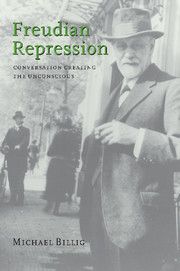Book contents
- Frontmatter
- Contents
- Acknowledgements
- 1 Introduction
- 2 The importance of repression
- 3 Thinking, speaking and repressing
- 4 Language, politeness and desire
- 5 Oedipal desires and Oedipal parents
- 6 Remembering to forget
- 7 Words of unconscious love
- 8 Repressing an oppressed identity
- 9 Ideological implications
- References
- Subject index
- Name index
8 - Repressing an oppressed identity
Published online by Cambridge University Press: 22 September 2009
- Frontmatter
- Contents
- Acknowledgements
- 1 Introduction
- 2 The importance of repression
- 3 Thinking, speaking and repressing
- 4 Language, politeness and desire
- 5 Oedipal desires and Oedipal parents
- 6 Remembering to forget
- 7 Words of unconscious love
- 8 Repressing an oppressed identity
- 9 Ideological implications
- References
- Subject index
- Name index
Summary
Habits of language are habits of life. Young Sigmund and Martha, in denying themselves the fun of the fair, were setting their lives on a course of bourgeois respectability. Like all couples, they would develop their domestic routines and their habits of talk. Habitually, speakers find their words moving in particular directions, which are not random. What is said habitually ensures that there are unspoken matters. In this sense, habits of language are repressive. As parts of wider cultural patterns, they are ideological, for ideology embraces the unsaid.
But what of psychoanalytic thinking itself? It is a habit of language, which has affected Western culture generally. Its explanations of human conduct claim to reveal what has been concealed. But maybe the habits of revelation themselves can hide. And what of the ideological background from which these habits of revelation arose? Perhaps, because Freud was leaving some matters unsaid, he was able to formulate new ways of analysing, which were also repressing as they were expressing their new forms of understanding.
This chapter explores the ideological background of Freudian psychoanalysis. It does so in relation to Freud's social position as a Jew in Austria. He had the misfortune to live at a time and in a place least favourable for Jews. In Freud's case, as with others, the insecurities of the outsider were translated into an extraordinary, unrepeatable creativity. However, the social catastrophe, which was building up throughout Freud's lifetime, was surprisingly absent in his writings.
- Type
- Chapter
- Information
- Freudian RepressionConversation Creating the Unconscious, pp. 216 - 252Publisher: Cambridge University PressPrint publication year: 1999



